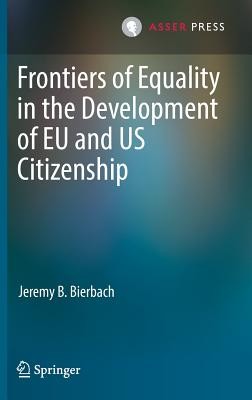
- Išsiųsime per 10–14 d.d.
- Autorius: Jeremy B Bierbach
- Leidėjas: T.M.C. Asser Press
- Metai: 2017
- ISBN-10: 9462651647
- ISBN-13: 9789462651647
- Formatas: 15.6 x 23.4 x 2.7 cm, kieti viršeliai
- Kalba: Anglų
- Extra -15 % nuolaida šiai knygai su kodu: ENG15
Frontiers of Equality in the Development of Eu and Us Citizenship + nemokamas atvežimas! | knygos.lt
Atsiliepimai
Aprašymas
This book provides a framework for comparing EU citizenship and US citizenship as standards of equality. If we wish to understand the legal development of the citizenship of the European Union and its relationship to the nationalities of the member states, it is helpful to examine the history of United States citizenship and, in particular, to elaborate a theory of 'duplex' citizenships found in federal orders. In such a citizenship, each person's citizenship is necessarily 'layered' with the citizenship or nationality of a (member) state. The question this book answers is: how does federal citizenship, as a claim to equality, affect the relationship between the (member) state and its national or citizen? Because the book places equality, not allegiance to a sovereign at the center of its analysis of citizenship, it manages to escape traditional analyses of the EU that measure it by the standard of a sovereign state. The text presents a coherent account of the development of EU citizenship and EU civil rights for those who wish to understand their continuing development in the case law of the Court of Justice of the European Union.Scholars and legal practitioners of EU law will find novel insights in this book into how EU citizenship works, in order to be able to grasp the direction in which it will continue to develop. And it may be of great interest to American scholars of law and political science who wish to understand one aspect of how the EU works as a constitutional order, not merely as an order of international law, by comparison to their own history.
Jeremy Bierbach is an attorney at Franssen Advocaten in Amsterdam. He holds a Ph.D. in European constitutional law from the University of Amsterdam, the Netherlands.
EXTRA 15 % nuolaida su kodu: ENG15
Akcija baigiasi už 2d.01:10:40
Nuolaidos kodas galioja perkant nuo 10 €. Nuolaidos nesumuojamos.

- Autorius: Jeremy B Bierbach
- Leidėjas: T.M.C. Asser Press
- Metai: 2017
- ISBN-10: 9462651647
- ISBN-13: 9789462651647
- Formatas: 15.6 x 23.4 x 2.7 cm, kieti viršeliai
- Kalba: Anglų
Scholars and legal practitioners of EU law will find novel insights in this book into how EU citizenship works, in order to be able to grasp the direction in which it will continue to develop. And it may be of great interest to American scholars of law and political science who wish to understand one aspect of how the EU works as a constitutional order, not merely as an order of international law, by comparison to their own history.
Jeremy Bierbach is an attorney at Franssen Advocaten in Amsterdam. He holds a Ph.D. in European constitutional law from the University of Amsterdam, the Netherlands.




Atsiliepimai